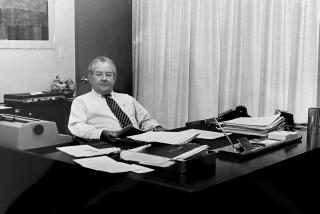Ousters, Client Losses Spur Dissension at UPI : Staff Morale Reported Deteriorating After Series of Firings; Major Papers Cancel News Service
- Share via
Mexican publishing magnate Mario Vazquez Rana’s $41-million gamble to save United Press International--already facing long financial odds--now is being plagued by internal dissension.
According to sources inside UPI, staff morale--a key to the agency’s survival through two years of wage cuts, bad checks and bankruptcy--has seriously deteriorated in recent weeks. At fault, insiders say, are the cancellation of UPI’s service last month by the New York Times and a series of firings undertaken as part of the new owner’s strategy.
Sources say further management upheaval could occur next week and that some additional clients, including the Wall Street Journal and the New York Daily News, have notified UPI that they are terminating the service.
Only One Major Rival
To many, UPI’s survival remains critical because, without it, much of the news reported on radio, television and in smaller newspapers across the nation would come from only one source, the rival Associated Press.
Many inside UPI believe Vazquez Rana, a proud man determined to succeed, will not easily surrender, particularly after paying nearly $22 million for the service last June and committing $18 million in additional working capital to rescue UPI from bankruptcy.
But, as one UPI staff member said, “Morale has never been this low, not even when the checks were bouncing, not even when we were in bankruptcy.”
The most disturbing event apparently was the firing last week of Managing Editor Ronald Cohen, a 25-year veteran widely credited with maintaining UPI’s quality and morale during bankruptcy. After his dismissal, UPI’s internal message wire was clogged with hundreds of farewells. By day’s end, the scroll of messages was 18 feet long, and some of the authors had done little to conceal their bitterness.
‘Lost the Road Map’
“If this is somebody’s idea of a ‘new direction’ for UPI, we think they lost the road map,” “Rocky” cabled from the Oklahoma City bureau.
“Have been waiting for some good news but looks as if the date for that has now been advanced indefinitely,” said Dallas, in mock bureaucratese.
This week, UPI’s union protested Cohen’s ouster by having the wire service’s reporters keep their names, or bylines, off stories, a symbolic dissent protected by the union contract.
President Also Dismissed
Dismissed along with Cohen was UPI President Maxwell McCrohon, whose departure sent fewer ripples through the company because he was more removed from the reporters and editors. Officially, the two firings were unrelated.
Present UPI President Milton Benjamin, a consultant to the company before being named to replace McCrohon, said he was not involved in firing Cohen and could not “give a reading on morale.”
Vazquez Rana, who assured Cohen in a letter that he had no hand in the firing, was traveling this week and was not available for comment.
One reason Cohen’s dismissal caused such reaction is that the reasons for it were never made clear to UPI’s staff.
Officially, the decision came from UPI Editor-in-Chief Mike Hughes, who reportedly said Cohen was too tied to conventional Washington news.
But, according to insiders, company officers working closely with Vazquez Rana have drawn up what UPI staff members call a “hit list” of top-ranking executives to be fired. Cohen and several others were on it. Sources said the firings were intended to cut costs and open positions for new managers.
Sources inside the company say Hughes objected to the list, as did McCrohon. After a bitter dispute, Hughes agreed to fire Cohen in order to save others. McCrohon, whose days also were numbered, resigned over the firing, sources said.
In an interview, Hughes was carefully oblique. “I was the messenger indeed. As I told Ron (Cohen), I take full responsibility for the action being taken. I was the one who gave him the news.”
Possible Showdown
Hughes is on vacation this week, but insiders say that, when he returns, there could be a showdown with Vazquez Rana and Benjamin over who has ultimate authority in the newsroom.
Hughes refused to comment on those reports. McCrohon has refused to comment at all.
But awareness of such a list, and the expectation that there could be more firings, has caused uneasiness within the service.
The independence of UPI’s news operation has been a subject of speculation since Vazquez Rana took over. Some newspaper editors have expressed concern that the new owner comes from a country where the press does not have the same tradition of political independence as that in the United States, a sentiment some UPI executives have charged comes close to ethnic prejudice.
Vazquez Rana repeatedly has told clients that he has no intention of involving himself in the news report, and even Cohen, in an interview after his firing, said, “I have not seen any overt evidence of Vazquez Rana interfering with actual coverage.”
Owner Aloof From Staff
Whether compelled by political sensitivity or personal style, Vazquez Rana has remained aloof from most employees, even some high-ranking ones.
One former aide complained that he asked Vazquez Rana repeatedly to inform his staff of intended changes as a way of bolstering morale but was told employees had no need to know.
Critics within the company have also complained about Vazquez Rana’s decision to fire the entire promotion department shortly after taking over.
“It came down that if (White House correspondent) Helen Thomas was making a speech somewhere and someone called wanting a picture and biography of her, the call would come to me,” Cohen said.
One UPI state editor said his staff was disturbed by reports that Vazquez Rana has said that all of the best people at UPI have left.
Benjamin agreed that staff quality is a problem. “The reality is that, when you look around the newsroom here, there are not a great number of people here who have worked for major news organizations.”
Poor Financial Condition
If changes have occurred abruptly, those close to the new owner said, one reason could be that Vazquez Rana found the news agency in far worse condition financially than he expected. He spent his first weeks after acquiring the company going over every financial record, sometimes staying late into the night reviewing small expense receipts, to an get intimate sense of how the company operated.
UPI has not turned a profit in 25 years, in part because the rival Associated Press is a nonprofit cooperative owned by the newspaper industry, the very clients UPI must woo.
UPI’s longtime owner, E.W. Scripps & Co., resisted investing heavily in the money-losing company and in 1982 gave the news agency away for $1 to two Nashville businessmen with little capital. They sold off most of UPI’s profitable operations to finance their losses, until 1985, when the company filed for bankruptcy to avoid the Internal Revenue Service’s seizing its revenues for back payroll taxes.
Whatever happens next, many believe that Vazquez Rana, the head of Mexico’s largest newspaper chain, has the cash and will to give UPI more time. “He’s obsessed with the financial success of UPI,” one former aide said. “He has a thing about failure. He’s fanatical on the subject.”
Series of Client Pull-Outs
This could be a challenge, however, because UPI recently lost several major clients. In addition to the New York Times, the Wall Street Journal and the New York Daily News--all of which said they are stopping the service as a cost-cutting measure--other papers, including the Los Angeles Times, Washington Post and Chicago Tribune, are watching the situation closely.
This has raised speculation that Vazquez Rana may redirect the company toward other businesses, such as attracting corporations with financial news. However, he already has rejected a proposal to hire more financial writers.
Benjamin, who was working as a consultant on UPI’s long-term plans before being named president, has said that “the heart of the business has to remain the news service that UPI provides to newspapers and broadcasters.”
Benjamin said he was “hopeful we can persuade the New York Times to continue with us on some basis.”
He maintained that UPI’s future is brighter today than it has been for years. “For the first time in a quarter of a century, the organization has an ownership that not only has the money but the commitment to build it into a world-class news organization.”
Despite his firing, Cohen agreed. “I hope it is not too late,” he said.
More to Read
Sign up for Essential California
The most important California stories and recommendations in your inbox every morning.
You may occasionally receive promotional content from the Los Angeles Times.













